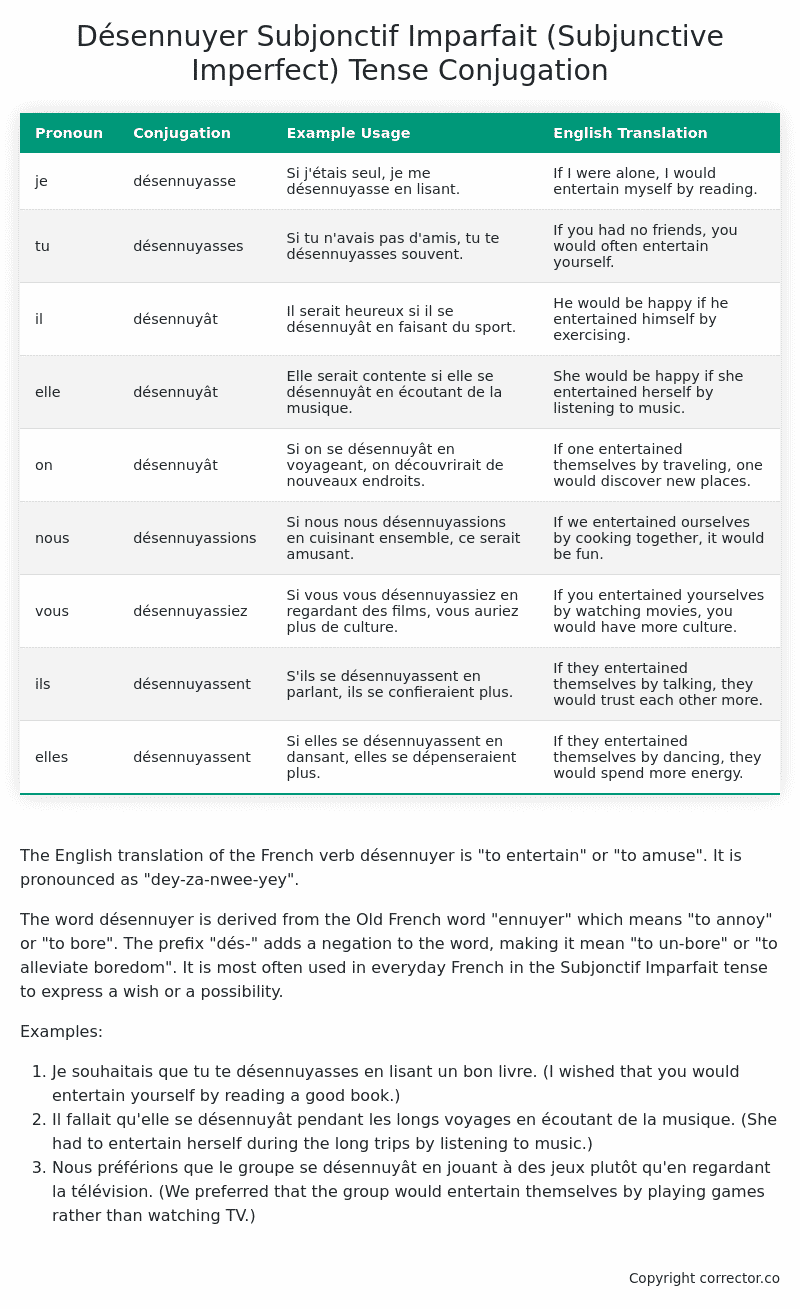Subjonctif Imparfait (Subjunctive Imperfect) Tense Conjugation of the French Verb désennuyer
Introduction to the verb désennuyer
The English translation of the French verb désennuyer is “to entertain” or “to amuse”. It is pronounced as “dey-za-nwee-yey”.
The word désennuyer is derived from the Old French word “ennuyer” which means “to annoy” or “to bore”. The prefix “dés-” adds a negation to the word, making it mean “to un-bore” or “to alleviate boredom”. It is most often used in everyday French in the Subjonctif Imparfait tense to express a wish or a possibility.
Examples:
- Je souhaitais que tu te désennuyasses en lisant un bon livre. (I wished that you would entertain yourself by reading a good book.)
- Il fallait qu’elle se désennuyât pendant les longs voyages en écoutant de la musique. (She had to entertain herself during the long trips by listening to music.)
- Nous préférions que le groupe se désennuyât en jouant à des jeux plutôt qu’en regardant la télévision. (We preferred that the group would entertain themselves by playing games rather than watching TV.)
Table of the Subjonctif Imparfait (Subjunctive Imperfect) Tense Conjugation of désennuyer
| Pronoun | Conjugation | Example Usage | English Translation |
|---|---|---|---|
| je | désennuyasse | Si j’étais seul, je me désennuyasse en lisant. | If I were alone, I would entertain myself by reading. |
| tu | désennuyasses | Si tu n’avais pas d’amis, tu te désennuyasses souvent. | If you had no friends, you would often entertain yourself. |
| il | désennuyât | Il serait heureux si il se désennuyât en faisant du sport. | He would be happy if he entertained himself by exercising. |
| elle | désennuyât | Elle serait contente si elle se désennuyât en écoutant de la musique. | She would be happy if she entertained herself by listening to music. |
| on | désennuyât | Si on se désennuyât en voyageant, on découvrirait de nouveaux endroits. | If one entertained themselves by traveling, one would discover new places. |
| nous | désennuyassions | Si nous nous désennuyassions en cuisinant ensemble, ce serait amusant. | If we entertained ourselves by cooking together, it would be fun. |
| vous | désennuyassiez | Si vous vous désennuyassiez en regardant des films, vous auriez plus de culture. | If you entertained yourselves by watching movies, you would have more culture. |
| ils | désennuyassent | S’ils se désennuyassent en parlant, ils se confieraient plus. | If they entertained themselves by talking, they would trust each other more. |
| elles | désennuyassent | Si elles se désennuyassent en dansant, elles se dépenseraient plus. | If they entertained themselves by dancing, they would spend more energy. |
Other Conjugations for Désennuyer.
Le Present (Present Tense) Conjugation of the French Verb désennuyer
Imparfait (Imperfect) Tense Conjugation of the French Verb désennuyer
Passé Simple (Simple Past) Tense Conjugation of the French Verb désennuyer
Passé Composé (Present Perfect) Tense Conjugation of the French Verb désennuyer
Futur Simple (Simple Future) Tense Conjugation of the French Verb désennuyer
Futur Proche (Near Future) Tense Conjugation of the French Verb désennuyer
Plus-que-parfait (Pluperfect) Tense Conjugation of the French Verb désennuyer
Passé Antérieur (Past Anterior) Tense Conjugation of the French Verb désennuyer
Futur Antérieur (Future Anterior) Tense Conjugation of the French Verb désennuyer
Subjonctif Présent (Subjunctive Present) Tense Conjugation of the French Verb désennuyer
Subjonctif Passé (Subjunctive Past) Tense Conjugation of the French Verb désennuyer
Subjonctif Imparfait (Subjunctive Imperfect) Tense Conjugation of the French Verb désennuyer (this article)
Subjonctif Plus-que-parfait (Subjunctive Pluperfect) Tense Conjugation of the French Verb désennuyer
Conditionnel Présent (Conditional Present) Tense Conjugation of the French Verb désennuyer
Conditionnel Passé (Conditional Past) Tense Conjugation of the French Verb désennuyer
L’impératif Présent (Imperative Present) Tense Conjugation of the French Verb désennuyer
L’infinitif Présent (Infinitive Present) Tense Conjugation of the French Verb désennuyer
Struggling with French verbs or the language in general? Why not use our free French Grammar Checker – no registration required!
Get a FREE Download Study Sheet of this Conjugation 🔥
Simply right click the image below, click “save image” and get your free reference for the désennuyer Subjonctif Imparfait tense conjugation!

Désennuyer – About the French Subjonctif Imparfait (Subjunctive Imperfect) Tense
Formation
Common Everyday Usage Patterns
Interactions with Other Tenses
Subjonctif Présent
Indicatif Passé Composé
Conditional
Conditional Perfect
Summary
I hope you enjoyed this article on the verb désennuyer. Still in a learning mood? Check out another TOTALLY random French verb conjugation!


